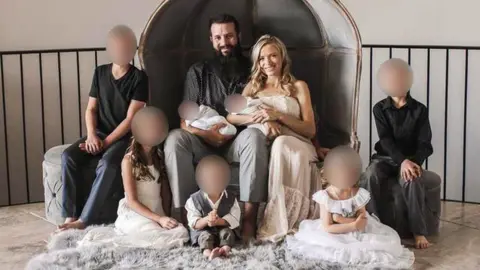Mexico Mormons: Nine US citizens, including children, killed in ambush
 CBS news
CBS news Nine US citizens, three women and six children, have been killed in an attack by suspected drug cartel gunmen in northern Mexico.
The victims are members of the LeBaron family, linked to a breakaway Mormon community that settled in Mexico several decades ago.
The victims were travelling in a convoy of vehicles.
The security minister said the group could have been targeted accidentally as a result of mistaken identity.
Sonora state in northern Mexico is being fought over by two rival gangs, La Línea, which has links to the larger Juárez cartel, and "Los Chapos", which is part of the Sinaloa cartel.
In a tweet President Donald Trump described the victims as a group of "wonderful family and friends" who "got caught between two vicious drug cartels, who were shooting at each other".
The US "stands ready", he said, to offer support to combat the problem of cartel violence and "do the job quickly and effectively". The FBI has offered to assist Mexican authorities in the investigation, CNN reports.
Mexico's President, Andrés Manuel López Obrador, said Mexico would act with "independence and sovereignty" in pursuing the criminals behind the attack.
A relative of the victims, Alex LeBaron, told CNN that the bodies of the deceased had been returned to their family ranch.
What do we know about the ambush?
A group of three mothers and their 14 children had set off in a convoy of three cars from Bavispe in Sonora state and were heading to the neighbouring state of Chihuahua. The women had been travelling together "for safety reasons", an unnamed relative told CNN.
Nine people were killed after they were ambushed by gunmen in Bavispe.
A burnt-out SUV was later found by the side of the road with the remains of some victims and there are reports that other family members were shot at as they tried to flee.

An investigation has been launched and additional security forces have been sent to the area, the governments of Chihuahua and Sonora said in a joint statement.
Claudia Pavlovich Arellano, governor of the state of Sonora, described the perpetrators as "monsters".
"As a mother, I feel anger, revulsion and a profound pain for the cowardly acts in the mountains between Sonora and Chihuahua," she wrote on Twitter, in Spanish.
Julian LeBaron, a cousin of one of the women, said he did not know what could have motivated the killings, which he said had involved two separate attacks.
"We want to know exactly who was behind this, why they did it and from where they are, and we need that information to be true," he told Mexican radio.
"We don't know who would attack women and children."
Who are the victims?
Mr LeBaron gave a detailed account of the attacks in an an interview for Mexican radio station el Heraldo.
His cousin Rhonita Miller, 30, four of her children, two of whom were babies, died in a car in the first attack, he said.
Another cousin, Dawna Ray Langford, 43, and a woman called Christina Langford Johnson, 31 later left in separate cars and were ambushed in a second attack, he said.
Both women were killed, along with two of Ms Ray Langford's children, aged four and six.
Faith Marie Johnson, seven months old, survived and was found by Mr LeBaron in the car, according to his account.
Seven children escaped, fleeing the scene, five of whom were injured and taken to hospital in Phoenix, Arizona, Mr LeBaron added.
Who are the Colonia LeBaron?
The victims were members of a community called Colonia LeBaron which was founded by a breakaway Mormon group in the first half of the 20th Century after the Church of Jesus Christ of Latter-day Saints in the US starting cracking down on polygamy.
The mainstream Mormon Church publicly rejected polygamy - the custom of having more than one spouse at the same time - in 1890 and since then, some groups who wished to continue the practice have broken away.
The Colonia LeBaron community now includes both Mormons and Catholics who have settled there. Members are known for standing up to local drug gangs and speaking out about the high levels of cartel violence. It has about 3,000 members, some of whom practise polygamy.
While local media say the convoy of cars may have been mistaken for that of a rival gang, the LeBaron community has been targeted by the cartels in the past. In 2009, Erick LeBaron was kidnapped for ransom. The community took a stand and said it would not pay for his release as that would just encourage future kidnappings.
Erick LeBaron was eventually released without a ransom being paid. But months later, his brother Benjamin, who had led the campaign for Erick's LeBaron's release, was beaten to death. Benjamin's brother-in-law was also killed.
In 2010, Julian LeBaron published an article in the Dallas Morning News calling for Mexicans to stand up against organised crime.
Mr LeBaron also told Mexican radio on Tuesday that his family had received threats. "We reported the threats, and these are the consequences," he said.
Last year, the family also clashed with local farmers who accused the LeBarons of using excessive amounts of water to grow walnut trees on their land, allegedly leaving nearby farms dry.
The Colonia LeBaron community has in the past demanded to be allowed to create its own security force.
How bad is drug-related violence in Mexico?
The power and influence of the Sinaloa cartel was on display last month when its members barricaded streets and clashed with security forces in Culiacán after one of their leaders, Ovidio Guzmán López, was arrested.
With the security forces outnumbered and surrounded, the Mexican government took the controversial decision to free Ovidio Guzmán to prevent further bloodshed.
The BBC's Will Grant in Mexico says pressure is growing on the government to adopt more coherent security strategies following this embarrassing episode.